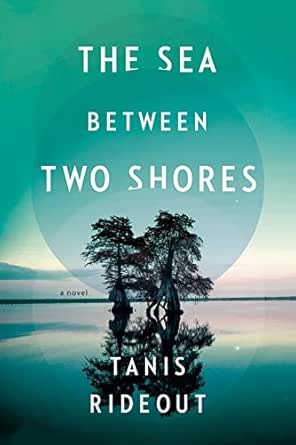4 Stars
I loved Tanis Rideout’s previous novel, Above All Things, which I read in 2012. It made a real impression on me because I still remember it a decade later. I was anxious to read her sophomore novel, and I was not disappointed.
In
the 1830s, William and Josephine Stewart left Nova Scotia and travelled to the
island of Iparei in what is now known as Vanuatu in the South Pacific. Their intention was to convert the Indigenous
Peoples to Christianity, but their arrival brought disease, caused friction,
and led to violence. In 2013, Michelle
Stewart, a descendant of these missionaries, lives in Toronto. Her family has been devastated by the death,
the previous year, of the middle child Dylan.
Michelle is invited to attend a reconciliation ceremony on the island
for their ancestors. She accepts the
invitation and brings her husband Scott, her mother Joyce, and her children,
Zach and Astrid, with her. On the
island, Michelle and her family are hosted by Rebecca and David Tabé and their children, Jacob and Anaei.
The Tabé family is also in mourning because
of the death of the youngest child Ouben after a cyclone six months earlier. In their time together, both families learn
that they are connected by losses in the present and by the actions of
ancestors in the past. David says, “’There
are things that must be put to rest if we want to move forward,’” and his comment
applies to both the present and the past, and to individuals and the community.
The perspectives of various characters are given: Michelle, Scott, Zach, Rebecca, David, and Jacob. This approach to point of view allows the reader to learn everyone’s thoughts and feelings which are often not expressed to others. William and Josephine are not given a voice, except through some fragmentary pages from Josephine’s diary. Instead, through interspersed sections, we are given the perspective of Faina, a girl living at the time of William and Josephine’s arrival. She sheds light on the reactions of the islanders to the missionaries.
Grief is a major theme. Though the circumstances are different, the death of a child is a loss experienced by both families. Though the sorrow of both mothers is described in heartbreaking terms, Michelle has much more difficulty moving on, though Ouben’s death was much more recent. Rebecca has rituals, such as wearing a fasting cord, and she goes to a cave sacred to women, a place that connects her to her ancestors: “There is comfort in this connection, less an erasure of her own suffering, her own fear and hope, than an embrace.”
Michelle, on the other hand, carries her grief in a “fragile, angry way.” She lashes out and so finds herself isolated from those closest to her. Rebecca notices that the members of Michelle’s family “are careful and distant with one another – a flicker of resentment, of frustration, sparks among them.” Michelle is so focused on her own grief, that she seems not to realize that others too have experienced loss. Jacob tells Zach, “’It wasn’t just your ancestors that were killed here. So many of our people got sick and died after the missionaries came, the traders. We need to remember them too. There are many sides to the story.’”
In many ways, Michelle illustrates the attitudes of the whites who came to the island. When Rebecca takes her to the special cave, Michelle “simply sees a cave, something empty and dark, that is only meaningful because of how her own people might have marked it. Initially, she doesn’t seem to understand that it is not just the islanders who have to “’honour [their] obligations. ‘’’ Just as Josephine seemed to say sorry often, Michelle does too. Rebecca comments, “The woman is always apologizing . . . The words come easy to her, but they’re hollow.”
One of the messages of the book is that reconciliation is not just apologizing and asking for forgiveness. Zach thinks of his mother’s “vague sorrys, and how useless a word it is on its own.” The point is that “’forgiveness is only part of the work. We must repair the road that was broken. Then we can begin to move forward, together.’” Michelle does admit to realizing something: “’I always thought what happened here was ancient history, but I know now that’s not true. Their ghosts are all around us.’” And she does offer something, “’I know it doesn’t change anything . . . but it’s something – a beginning.’” All of this reminded me so much of the situation of Canada’s First Nations peoples and the need for proper reconciliation.
I appreciated the references to climate change and its impact on the islanders. David explains that “’the storms that come now are so much worse, so much stronger than they used to be.’” Rebecca tells Michelle, “’We are not the ones causing these changes. And yet these storms grow worse every year, causing more and more damage, because you refuse to see what you are doing to the rest of the world. Our islands are going to be swallowed by the sea.’” And Jacob talks to Zach about the garbage that washes up on their beach: “’All this crap gets washed up from other places.’”
There is so much in this book to inspire thought. It certainly left me thinking more about both the actions of Canadians in the past and our behaviour in the present. This novel with its thematic depth is one I will be highly recommending to others.
Note: I received a digital galley from the publisher via NetGalley.
Anyone who has not read Above All Things is in for a treat. Here’s my review: https://schatjesshelves.blogspot.com/2015/08/from-schatjes-reviews-archive-review-of.html

Thank you so much for your lovely review! I'm so glad you liked the book. (https://twitter.com/tanisrideout/status/1570830661019377664)
ReplyDelete